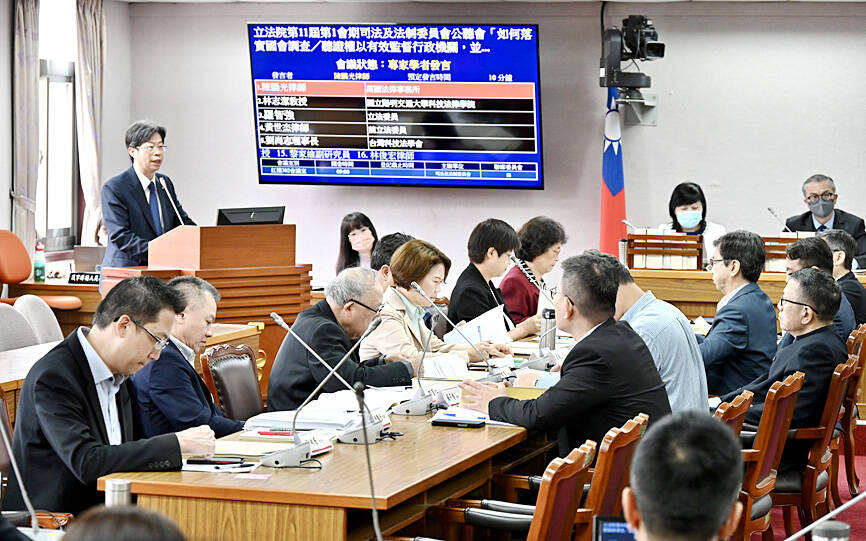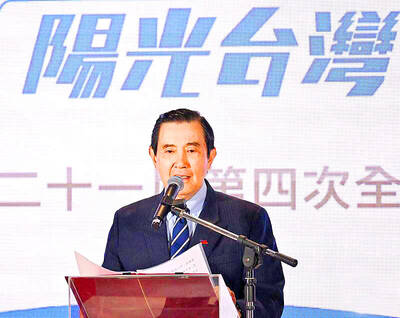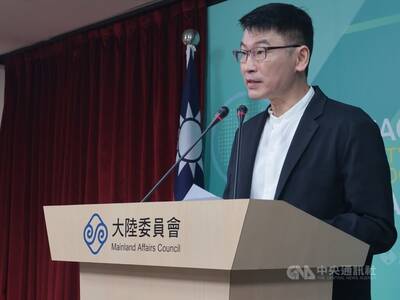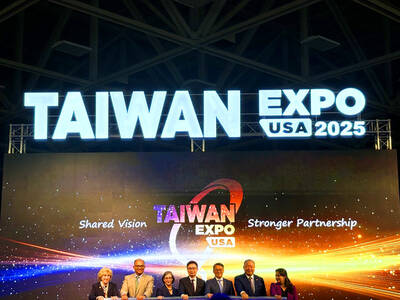Elected legislators should not change the law to suit their own interests and take on the role of a court judge by conducting judicial investigations, legal experts said at the hearing held at the Legislative Yuan in Taipei on Wednesday.
Legislators have the power to enact laws, so they should not act as court judges since it would result in an overlap between legislative and judicial powers, attorney Chen Yu-hsin (陳又新) said.
“Seeking to expand power to have more resources and weapons for lawmakers to do their job is in the right direction. However, playing the role of a court judge would contravene our Constitution and the separation of powers between the five branches of government,” he added.

Photo: George Tsorng, Taipei Times
“When it comes to aiding in a judicial investigation, the case must directly be under the Legislative Yuan’s scope or related to scrutinizing activities of government departments,” said Carol Lin (林志潔), a professor in the school of technology law at National Yang Ming Chiao Tung University.
“If left unchecked, with no limits on their power of investigation, then unethical lawmakers would abuse it, using it for intimidation and extortion against private citizens and companies,” Lin said.
She said that under the Chinese Nationalist Party’s (KMT) proposal, lawmakers would have the power to investigate private citizens, businesses, foundation entities, religious institutions, hospitals, schools and other organizations, and lawmakers would have the legal authority to request to see financial statements, accounting reports, records of board meetings and internal documents.
“If they refuse to do so, then under the KMT’s proposal, they could be charged on with ‘contempt of the legislature,’” Lin said. “Most legal experts are against this stance, because in legal procedures, the defendant and witnesses have the right against ‘self-incrimination,’ when asked to provide a statement that might expose them to criminal prosecution.”
The Constitution is firmly set on the separation of powers between the five branches of government, where lawmakers in the Legislative Yuan have equal standing, in terms of power, to the Presidential Office and the Judicial Yuan; they must mutually respect the separation of powers and not have an overlap in the exercise of their power, which would lead to conflict, said Chang Hsien-chao (張顯超), a professor of law at National Sun Yat-sen University.
Lawmakers of the two main opposition parties, the KMT and Taiwan People’s Party (TPP) are seeking to expand the power of the Legislative Yuan, to have the authority to conduct investigations and to hold legislative hearings.
They want to emulate the US system, giving the Legislative Yuan power akin to a US congressional hearing and the right to conduct an investigation, obtain information on proposed legislation, evaluate and scrutinize activities of government departments.

‘ANGRY’: Forgetting the humiliations and sacrifices of ‘the people of the Republic of China’ experienced disqualified Lai from being president, Ma Ying-jeou said Former president Ma Ying-jeou (馬英九) yesterday criticized President William Lai (賴清德) over what he called “phrasing that downplayed Japan’s atrocities” against China during World War II. Ma made the remarks in a post on Facebook on the 80th anniversary of the end of World War II. Ma said he was “angry and disappointed” that Lai described the anniversary as the end of World War II instead of a “victory in the war of resistance” — a reference to the end of the Second Sino-Japanese War (1937-1945). The eight-year war was a part of World War II, in which Japan and the other Axis

The Mainland Affairs Council (MAC) yesterday announced a ban on all current and former government officials from traveling to China to attend a military parade on Sept. 3, which Beijing is to hold to mark the 80th anniversary of the end of the Second Sino-Japanese War. "This year marks the 80th anniversary of the end of World War II and the Republic of China’s victory in the War of Resistance [Against Japan]," MAC Deputy Minister and spokesperson Liang Wen-chieh (梁文傑) told a regular news briefing in Taipei. To prevent Beijing from using the Sept. 3 military parade and related events for "united

‘OFFSHORE OPERATIONS’: Also in Dallas, Texas, the Ministry of Economic Affairs inaugurated its third Taiwan Trade and Investment Center to foster closer cooperation The 2025 Taiwan Expo USA opened on Thursday in Dallas, Texas, featuring 150 Taiwanese companies showcasing their latest technologies in the fields of drones, smart manufacturing and healthcare. The Taiwan External Trade Development Council (TAITRA), the event’s organizer, said the exhibitors this year include Hon Hai Precision Industry Co (Foxconn), the world’s largest contract electronics manufacturer; AUO; PC brand Asustek Computer; and drone maker Thunder Tiger. In his opening speech, TAITRA chairman James Huang (黃志芳) said he expected Texas to become a world-class center for innovation and manufacturing as US technology companies from Silicon Valley and Taiwanese manufacturers form an industrial cluster

A 20-year-old man yesterday evening was electrocuted and fell to his death after he climbed a seven-story-high electricity tower to photograph the sunset, causing a wildfire on Datong Mountain (大同山) in New Taipei City’s Shulin District (樹林), the Taoyuan Police Department said today. The man, surnamed Hsieh (謝), was accompanied on an evening walk by a 20-year-old woman surnamed Shang (尚) who remained on the ground and witnessed the incident, capturing a final photograph of her friend sitting atop the tower before his death, an initial investigation showed. Shang then sought higher ground to call for help, police said. The New Taipei